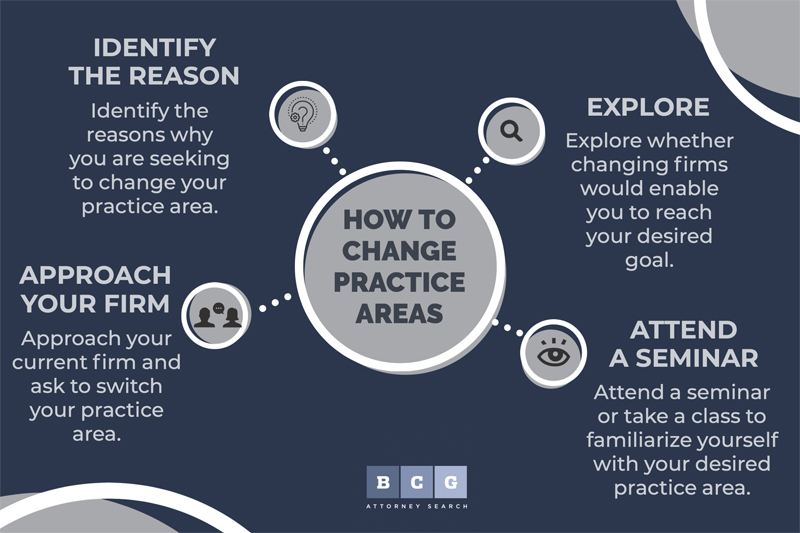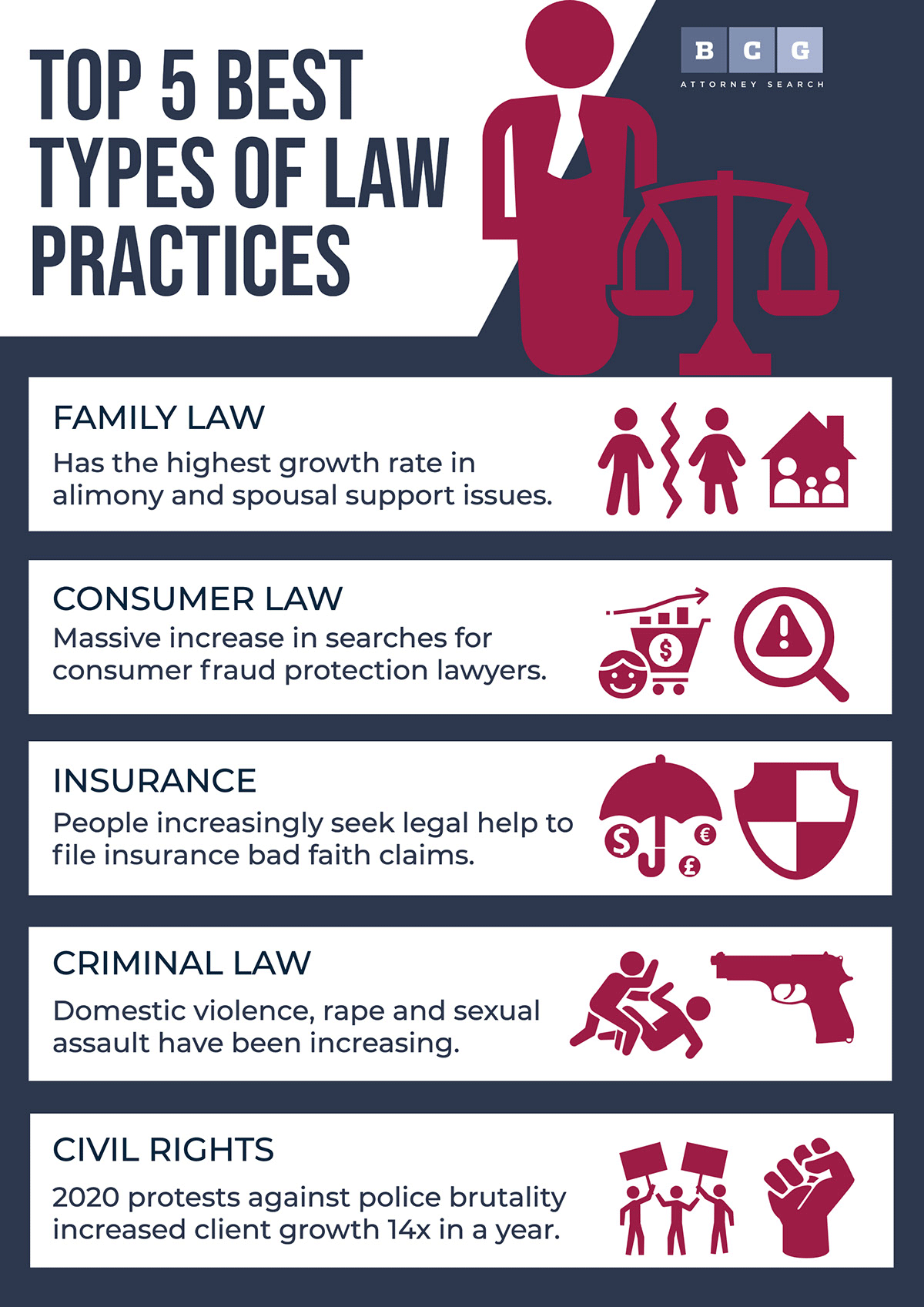Harrison Barnes' Legal Career Advice Podcast - Episode 92
- Many attorneys seem to choose the prestige of a law firm without considering the practice area in which they will be working.
- This is why a large number of attorneys find themselves in the wrong practice area.
- While switching practice areas can be difficult, it is not entirely impossible.
- Changing practice areas will entail academic and work-related qualifications.

Can Lawyers Change Specialties?
Attorneys' paths to law firms are often nothing less than insanity in many regards. A majority of attorneys interview for summer associate jobs, take the best offer and sign up with a particular firm without considering what practice area they will serve. It is especially important that people enjoy the work they do, and the process attorneys go through to choose a practice area makes little sense in a lot of ways. Consequently, it is not surprising that we receive many calls from lawyers seeking to switch their practice areas on a daily basis.
|
| Harrison Barnes |
Although switching practice areas is difficult, it is possible. It depends on your academic background, your length of experience, the law firm with which you work, the current legal job market, the market demand for the practice areas you wish to leave or enter, and, perhaps, just pure luck, whether you are able to switch practice areas. Nevertheless, the decision to change practice areas should be based on the question of who you are.
- The transition is smoother when a firm embraces flexibility, as highlighted in Bond, Schoeneck & King PLLC: Your Pathway to a Thriving Legal Career.

It is important to remember that switching practice areas is not an easy decision. It is more important to practice work that suits your skills and interests than anything else. Furthermore, switching firms to join a new practice area may not always be the best choice. A law firm may allow you to switch practices within its confines, for example. Legal recruiters should not be enlisted if this is possible.
- For a deeper look into whether such career transitions are realistic long-term, see the Viability of Switching Practice Areas for Attorneys: A Detailed Exploration.
10 Tips to Change Legal Practice Areas Successfully
In essence, it will take a lot of effort on several fronts to change legal practice areas successfully. The process will also take time, so it is important not to rush it. The transition to your new area of legal practice may take 1-2 years. If changing your practice area might solve your dissatisfaction, consider this video on alternatives to moving law firms.
- Lawyers thinking about transitioning to higher-paying practice areas may find Cracking the Legal Fortune: Top 10 Practice Areas with the Highest Salaries especially useful.
1. Study
You will have to start all over in law if you switch practice areas. Prepare yourself for studying! Examine current cases, regulations, and case law for family law for 30 minutes a day. In the morning, look up cases on our Supreme Court website and keep yourself up to date on the current affairs.
2. Find a Mentor
Besides regular study, finding a mentor is one of the most important tips for changing practice areas successfully.
There is no price you can put on that. You do not just need a mentor who will teach you the practice of law, but also the business of it. Therefore, you need help with the business aspect of practicing in a variety of different fields, and finding someone who can guide you in this regard is extremely important.
To find a mentor, look for people who have made themselves known as leaders in your new practice area community and start a conversation with them.
"Is it okay to speak to you about this case?" is an example of how it can be done. Would you be able to speak with me about this challenge I am having with this judge? Do you see the same thing? Is it just that I am new? Over time, those relationships grow.
3. Write
Explaining something to someone else is the best way to understand it. Write about what you learn instead of just reading. As soon as you are ready, post what you have learned on your website. By doing so, you can communicate that you now practice in your new field.
4. Network with Others in Your New Practice Area
It can be invaluable for you to meet others who practice in your new area in order to learn more about who you will be interacting with. Discover the nuances of judges in your area, opposing counsels, and more.
Attend bar events in practice areas. Make contact with others who practice in your new area of practice in your jurisdiction. You can also plan your own event!
5. Do CLEs Targeted for Your New Practice Area
You should also investigate quality CLEs as an additional means of honing your expertise in your new area of law beyond your study of case law. In any case, you must satisfy your CLE requirements, so why not also become proficient in the new area you want to learn!
6. Use Google Alerts
Keeping up with the latest developments in your new area of practice? If your area of practice is covered by Google results, set up an alert for new results. The notification frequency and the sites from which you will receive the notifications can both be customized so it's possible to follow as many or as few as you want.
7. Learn the Business Side of Things
When you learn a new practice area, you will need to learn more than just the law. It's important to become familiar with the business side of things too and to seek out mentorship if necessary.
Billing in disability law cases differs quite a bit from billing in family law cases, for example.
8. Establish a New Network
If you are moving into a new field of practice, it is recommended you think about those connections that are one or two steps away from the clients you want. Connect with these individuals. Using disability law as an example, these would-be doctors. In family law, this could be a therapist. Keeping in touch with people in these roles, attending networking events for these groups, and making it known that you practice in a relevant area of law will help you earn referrals in the future.
9. Do Not Forget Your Old Network
Keeping and building your existing network is still very important, despite the need to build a new one. If you are doing anything different, they must know about it. When you don't practice in a particular area of law, it is likely someone from your old network will hire someone else to represent you.
It's important to note that if you become a "hybrid", your old network will become of even greater importance.
10. Create structure
For attorneys switching practice areas in tough times, this tip is particularly useful. A structure will keep you on track and keep you sane as you switch practice areas.
Every Sunday, you must create a "brain dump" from which you can generate your weekly action plan. Ensure that items on the list get you towards those goals, and complete as much as possible during the week by examining the future plans.
- To see how attorneys have successfully handled such shifts, read our Comprehensive Q&A on navigating career transitions.
What Is The Best Type Of Law To Practice?

The best type of law to practice currently is as follows:
1. Family Law:
Family Law experienced the highest growth rate in alimony and spousal support issues during the quarantine period, even if clients' interest in divorce grew during the period. Only in August 2020, alimony legal inquiries increased 49x year-over-year (YoY).
2. Consumer Law:
There was a sudden and massive increase in searches for consumer fraud protection lawyers beginning towards the end of June from prior year trends.
3. Insurance:
There is no doubt that insurance companies have been overwhelmed with loss claims this year and denied many of them. People facing denial of their insurance claims are increasingly seeking legal help to file insurance bad faith claims.
4. Criminal Law:
Criminal offenses saw huge growth this year, with DUIs, DWIs, and drug possession offenses topping the list with 32x increases over last year. In addition to domestic violence, rape and sexual assault saw alarming increases in clients.
5. Civil Rights:
2020 marked the start of protests across the country against police brutality led by Black Lives Matter. In June, July, and August, client growth increased 14x year over year.
6. Personal Injury:
In contrast to past years, there were significantly fewer drivers on the road in much of 2020. The number of car accident claims was lower than normal, but the number of commercial 18-wheeler accidents increased significantly. Legal queries related to wrongful death also increased significantly.
7. Estate Planning:
A major concern for many Americans has been estate planning since COVID-19. Accordingly, attorneys handling wills and trusts inquiries increased by over four times from the same period in the past. Similarly, inquiries about probate have increased nearly twofold.
8. Bankruptcy:
In the wake of the pandemic, non-essential businesses were forced to remain closed for most of 2020. As a result, Chapter 7 business bankruptcy inquiries increased 6x over last year.
9. Employment Law:
Attempts by employers to cut costs in order to avoid ranking #8 on this list resulted in historic highs in unemployment rates during 2020. As a result, wrongful termination lawyers became an attractive option for many Americans in order to negotiate a severance package or challenge the grounds for termination.
10. Business Law:
In addition to causing business owners to re-negotiate or re-arrange their business contracts, COVID-19 also forced many companies to review their existing customer or supplier relationships.
For a deeper look into developing a smooth, strategic plan for moving into a new specialty, see Switching Practice Areas – How to Successfully Transition Your Legal Career.
About Harrison Barnes
No legal recruiter in the United States has placed more attorneys at top law firms across every practice area than Harrison Barnes. His unmatched expertise, industry connections, and proven placement strategies have made him the most influential legal career advisor for attorneys seeking success in Big Law, elite boutiques, mid-sized firms, small firms, firms in the largest and smallest markets, and in over 350 separate practice areas.
A Reach Unlike Any Other Legal Recruiter
Most legal recruiters focus only on placing attorneys in large markets or specific practice areas, but Harrison places attorneys at all levels, in all practice areas, and in all locations-from the most prestigious firms in New York, Los Angeles, and Washington, D.C., to small and mid-sized firms in rural markets. Every week, he successfully places attorneys not only in high-demand practice areas like corporate and litigation but also in niche and less commonly recruited areas such as:
- Immigration Law
- Workers Compensation
- Insurance
- Family Law
- Trust and Estate
- Municipal law
- And many more...
This breadth of placements is unheard of in the legal recruiting industry and is a testament to his extraordinary ability to connect attorneys with the right firms, regardless of market size or practice area.
Proven Success at All Levels
With over 25 years of experience, Harrison has successfully placed attorneys at over 1,000 law firms, including:
- Top Am Law 100 firms such including Sullivan and Cromwell, and almost every AmLaw 100 and AmLaw 200 law firm.
- Elite boutique firms with specialized practices
- Mid-sized firms looking to expand their practice areas
- Growing firms in small and rural markets
He has also placed hundreds of law firm partners and has worked on firm and practice area mergers, helping law firms strategically grow their teams.
Unmatched Commitment to Attorney Success - The Story of BCG Attorney Search
Harrison Barnes is not just the most effective legal recruiter in the country, he is also the founder of BCG Attorney Search, a recruiting powerhouse that has helped thousands of attorneys transform their careers. His vision for BCG goes beyond just job placement; it is built on a mission to provide attorneys with opportunities they would never have access to otherwise. Unlike traditional recruiting firms, BCG Attorney Search operates as a career partner, not just a placement service. The firm's unparalleled resources, including a team of over 150 employees, enable it to offer customized job searches, direct outreach to firms, and market intelligence that no other legal recruiting service provides. Attorneys working with Harrison and BCG gain access to hidden opportunities, real-time insights on firm hiring trends, and guidance from a team that truly understands the legal market. You can read more about how BCG Attorney Search revolutionizes legal recruiting here: The Story of BCG Attorney Search and What We Do for You.
The Most Trusted Career Advisor for Attorneys
Harrison's legal career insights are the most widely followed in the profession.
- His articles on BCG Search alone are read by over 150,000 attorneys per month, making his guidance the most sought-after in the legal field. Read his latest insights here.
- He has conducted hundreds of hours of career development webinars, available here: Harrison Barnes Webinar Replays.
- His placement success is unmatched-see examples here: Harrison Barnes' Attorney Placements.
- He has created numerous comprehensive career development courses, including BigLaw Breakthrough, designed to help attorneys land positions at elite law firms.
Submit Your Resume to Work with Harrison Barnes
If you are serious about advancing your legal career and want access to the most sought-after law firm opportunities, Harrison Barnes is the most powerful recruiter to have on your side.
Submit your resume today to start working with him: Submit Resume Here
With an unmatched track record of success, a vast team of over 150 dedicated employees, and a reach into every market and practice area, Harrison Barnes is the recruiter who makes career transformations happen and has the talent and resources behind him to make this happen.
A Relentless Commitment to Attorney Success
Unlike most recruiters who work with only a narrow subset of attorneys, Harrison Barnes works with lawyers at all stages of their careers, from junior associates to senior partners, in every practice area imaginable. His placements are not limited to only those with "elite" credentials-he has helped thousands of attorneys, including those who thought it was impossible to move firms, find their next great opportunity.
Harrison's work is backed by a team of over 150 professionals who work around the clock to uncover hidden job opportunities at law firms across the country. His team:
- Finds and creates job openings that aren't publicly listed, giving attorneys access to exclusive opportunities.
- Works closely with candidates to ensure their resumes and applications stand out.
- Provides ongoing guidance and career coaching to help attorneys navigate interviews, negotiations, and transitions successfully.
This level of dedicated support is unmatched in the legal recruiting industry.
A Legal Recruiter Who Changes Lives
Harrison believes that every attorney-no matter their background, law school, or previous experience-has the potential to find success in the right law firm environment. Many attorneys come to him feeling stuck in their careers, underpaid, or unsure of their next steps. Through his unique ability to identify the right opportunities, he helps attorneys transform their careers in ways they never thought possible.
He has worked with:
- Attorneys making below-market salaries who went on to double or triple their earnings at new firms.
- Senior attorneys who believed they were "too experienced" to make a move and found better roles with firms eager for their expertise.
- Attorneys in small or remote markets who assumed they had no options-only to be placed at strong firms they never knew existed.
- Partners looking for a better platform or more autonomy who successfully transitioned to firms where they could grow their practice.
For attorneys who think their options are limited, Harrison Barnes has proven time and time again that opportunities exist-often in places they never expected.
Submit Your Resume Today - Start Your Career Transformation
If you want to explore new career opportunities, Harrison Barnes and BCG Attorney Search are your best resources. Whether you are looking for a BigLaw position, a boutique firm, or a move to a better work environment, Harrison's expertise will help you take control of your future.
Submit Your Resume Here to get started with Harrison Barnes today.
Harrison's reach, experience, and proven results make him the best legal recruiter in the industry. Don't settle for an average recruiter-work with the one who has changed the careers of thousands of attorneys and can do the same for you.
About BCG Attorney Search
BCG Attorney Search matches attorneys and law firms with unparalleled expertise and drive, while achieving results. Known globally for its success in locating and placing attorneys in law firms of all sizes, BCG Attorney Search has placed thousands of attorneys in law firms in thousands of different law firms around the country. Unlike other legal placement firms, BCG Attorney Search brings massive resources of over 150 employees to its placement efforts locating positions and opportunities its competitors simply cannot. Every legal recruiter at BCG Attorney Search is a former successful attorney who attended a top law school, worked in top law firms and brought massive drive and commitment to their work. BCG Attorney Search legal recruiters take your legal career seriously and understand attorneys. For more information, please visit www.BCGSearch.com.
Harrison Barnes does a weekly free webinar with live Q&A for attorneys and law students each Wednesday at 10:00 am PST. You can attend anonymously and ask questions about your career, this article, or any other legal career-related topics. You can sign up for the weekly webinar here: Register on Zoom
Harrison also does a weekly free webinar with live Q&A for law firms, companies, and others who hire attorneys each Wednesday at 10:00 am PST. You can sign up for the weekly webinar here: Register on Zoom
You can browse a list of past webinars here: Webinar Replays
You can also listen to Harrison Barnes Podcasts here: Attorney Career Advice Podcasts
You can also read Harrison Barnes' articles and books here: Harrison's Perspectives
Harrison Barnes is the legal profession's mentor and may be the only person in your legal career who will tell you why you are not reaching your full potential and what you really need to do to grow as an attorney--regardless of how much it hurts. If you prefer truth to stagnation, growth to comfort, and actionable ideas instead of fluffy concepts, you and Harrison will get along just fine. If, however, you want to stay where you are, talk about your past successes, and feel comfortable, Harrison is not for you.
Truly great mentors are like parents, doctors, therapists, spiritual figures, and others because in order to help you they need to expose you to pain and expose your weaknesses. But suppose you act on the advice and pain created by a mentor. In that case, you will become better: a better attorney, better employees, a better boss, know where you are going, and appreciate where you have been--you will hopefully also become a happier and better person. As you learn from Harrison, he hopes he will become your mentor.
To read more career and life advice articles visit Harrison's personal blog.














